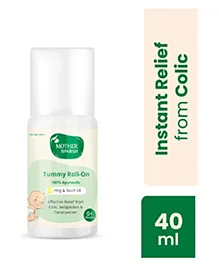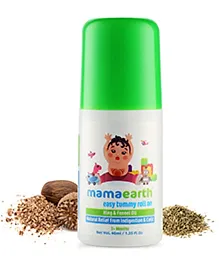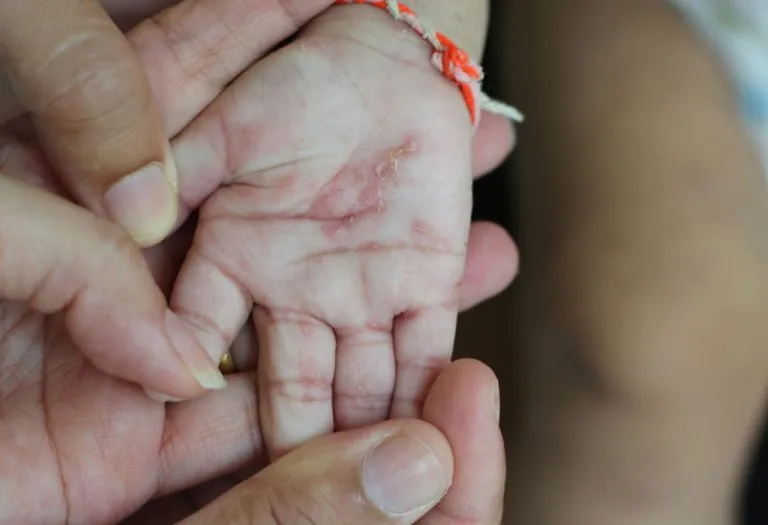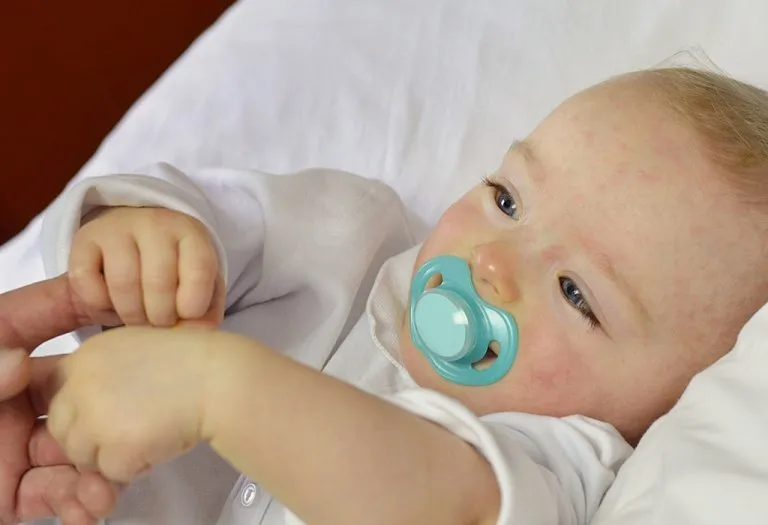Stomach Ache in Babies- Causes, Symptoms & Treatment

- Common Symptoms of Stomach Ache in Babies
- Common Reasons for Stomach Pain in Babies With Remedies
- Feeding Infants With Stomach Pain
- Tips to Soothe Your Baby’s Stomach Ache
- When to Call the Doctor?
- FAQs
Stomach pain in infants can cause worry and discomfort for both infants and their parents. While occasional stomach discomfort is expected as the baby’s digestive system develops, severe pain may indicate an underlying issue. Deciding what is bothering the baby is no child’s play. Since the baby cannot tell the feeling of pain, it always results in crying. In a newborn, stomach pain can be due to various health issues. Understanding the causes, symptoms, and treatment options for an infant’s belly pain is crucial for providing comfort and relief to your little one. Here, we have listed some common causes of stomach aches, symptoms, and treatment.
Common Symptoms of Stomach Ache in Babies
Some signs to look out for in your baby to see if he has a tummy ache:
- Acting more fussy or grumpy than usual
- Crying an unusual amount
- Diarrhoea
- Vomiting
- Squirming or tensing up of muscles
- Disturbed sleep
- Not feeding regularly
Common Reasons for Stomach Pain in Babies With Remedies
What causes stomach pain in newborn babies can depend on various factors, differing from mild to more severe conditions. Understanding the common reasons for newborn stomach pain can help you effectively identify and address the issue (1). Here are some of the reasons for stomach ache in babies:
1. Colic
Colic is characterised by incessant crying in infants. It occurs in babies who are 2- 3 weeks old and can last till they are 4-5 months old. It can also be called newborn gas pain. If your baby cries for as long as 2 hours a day for three days a week, it could be colic.
Causes
The causes of colic are not known exactly. It might be caused due to inhalation of excess air or indigestion. Some also wonder if some babies might be intolerant toward substances present in mother’s milk.
Symptoms
The baby might arch his back and bend his knees while crying. The abdominal muscles might get tensed, and baby might pass excess gas.
Treatment
Warm baths, warm compress on the tummy, knee push up exercises can ease the pain and help relieve the excess gas. There are no medications to treat colic. If it is severe, seek your doctor’s advice. Fennel tea, basil tea, and peppermint tea are home remedies for your child’s stomach pain caused due to colic. These natural substances have antispasmodic and anti-flatulence properties useful for treating gastrointestinal problems. If you do plan to give your baby any of these types of tea, ensure that you consult your paediatrician regarding side-effects, dosage, and how it should be given to your baby.
2. Constipation
Constipation commonly occurs in babies who have started solids. If your baby appears uncomfortable during a bowel movement or hasn’t had one in three days, it might be constipation.
Causes
It can be due to a milk allergy, lack of fibre in the baby’s diet, not having enough water, or due to holding in of bowel movement.
Symptoms
If the baby is constipated, the poop might come out as dry, hard stools. Also, look out if your baby is straining to poop. Any colour changes in the poop such as red, black, or maroon can be a cause of worry.
Treatments
If your baby has started on solids, give him foods that can ease constipation, such as pear, prune, oatmeal, and peas. Light exercises can also help; lay your baby on his back and move his legs in a cycling motion. Use an infant glycerine suppository if the doctor says it’s safe to do so since it provides lubrication for the baby to pass stools.
3. Reflux
This happens when the passageway between the oesophagus and stomach is not working properly. Reflux occurs when the food from the baby’s stomach comes back up and causes the baby to spit it out. It is also called gastroesophageal reflux (GER) and is rarely serious (4).
Causes
Reflux can occur due to an immature lower oesophagal sphincter (LES), which is a ring muscle that passes the food down the oesophagus and keeps it down in the stomach. Immature LES can open up and cause the food to come up.
Symptoms
Symptoms include gagging, choking, coughing, wheezing, and spitting up food. Reflux also causes babies to cry a lot during and after a feed (6).
Treatment
Frequent feeding can help. Also, keeping the babies head at an elevation using pillows after a feed is a good idea. Doctors might also prescribe medicines to reduce the acid in the stomach so that the discomfort during throwing up is reduced.

4. Diarrhoea
Diarrhoea leads to the watery stools. It can cause dehydration in babies.
Causes
It is commonly caused due to exposure to a virus known as rotavirus. Bacterial strains such as campylobacter, salmonella, escherichia coli can also cause diarrhoea. Another common cause is contaminated food and parasites.
Symptoms
Runny stools along with general signs of discomfort or fever.
Treatment
Since diarrhoea can lead to dehydration, intake of fluids in the form of water or breast milk is important. Consulting a doctor is highly recommended since you could receive a prescription for paediatric oral rehydration. Also, if your baby has started to take solid foods you must ensure that you give him healthy and light foods.
5. Intussusception
It is a rare condition that causes abdominal pain in babies and can occur when the baby is around 8-14 months. This occurs when one part of the intestine slides into another causing blockage and pain. This cuts off the supply of blood and other fluids (8).
Causes
The causes of this condition in infants are not clearly known, while in adults, this can be caused due to a tumour.
Symptoms
Your baby might pull up legs towards the stomach, vomit frequently, and pass dark, bloody stools containing mucus.
Treatment
Consult a doctor; your baby will likely have to go through an x-ray called barium enema that can push back the intestine.
6. Temporary Lactose Intolerance
This intolerance occurs when the body does not produce lactase enzyme that breaks down the sugar present in milk and other dairy products.
Causes
This condition occurs in infants with gastrointestinal ailments such as stomach flu and diarrhoea. These ailments can damage the lining of the small intestine making it difficult to digest lactose.
Symptoms
Some common symptoms are diarrhoea, abdominal cramping, bloating, and gas.
Treatment
Don’t give your baby any dairy product for a few days and discuss your baby’s condition with a paediatrician.
7. Motion Sickness
If your baby gets sick almost during car trips, it might be motion sickness. It usually causes stomach problems in babies, accompanied by sickness. But motion sickness is rare in babies who are less than two years of age.
Causes
Motion sickness occurs when there is a disconnect between what the baby sees and what they sense with the motion-sensitive parts of the body, such as ears and nerves.
Symptoms
Motion sickness is usually accompanied by tummy aches and nausea. The feeling of nausea can cause the baby to salivate more and drool. The baby might turn pale too.
Treatment
Take short breaks in between your journey. Also, plan your travel to coincide with the baby’s nap time. Ensure that the car does not smell. Fresh air will do a lot of good.
8. Appendicitis
It is an inflammation of the appendix that rarely occurs in newborn babies. The appendix is an appendage at the lower right corner of the abdominal cavity; when blocked, it swells up and causes pain (7).
Causes
The inflammation occurs when bacteria get trapped in the appendix by hard stools or a large nymph node compressing and blocking the opening. This causes swelling, that, in turn, increases the pressure and causes sharp pain.
Symptoms
Your baby will cry incessantly from the pain. Other symptoms include fever, vomiting, and sometimes diarrhoea.
Treatment
Surgical removal of the appendix is the only solution, to prevent the appendix from bursting. There is no need to worry since this is a common condition experienced by many people.
9. Paediatric Hernia
This is a condition that occurs when the small or large intestine slides out of the abdominal cavity causing discomfort and infection. There are two types of a hernia possible, inguinal hernia and umbilical hernia. When the intestine slips into the inguinal canal and causes swelling around the groin, it is called an inguinal hernia. An umbilical hernia occurs when the intestine slides out of a damaged abdominal wall behind the navel.
Causes
Weak abdominal muscles are the main factors leading to a hernia. In boys, it occurs if the inguinal canal is not closed properly and a part of the intestine moves into the canal.
Symptoms
A hernia is characterised by a full rounded belly, vomiting, pain, and fever.
Treatment
Surgical intervention is required for this condition. A hernia might also close on its own over a period, but the pain can cause a need for medical intervention.
10. Urinary Tract Infection
Urinary tract infection can occur in infants as early as 12 months. It causes pain in the lower abdomen. A bacterial infection anywhere along the tract can lead to this condition (9).
Causes
The infection commonly occurs when bacteria from outside gets inside the bladder or urethra. This condition is not caused by lack of hygiene.
Symptoms
Fever, crying during urination (that indicates pain), and odd-smelling urine are some of the symptoms.
Treatment
Antibiotics are used to treat this infection. Consult a doctor to get a prescription for an antibiotic suitable for the baby’s age. Also, take care to complete the entire course of antibiotics to completely cure the condition.
Feeding Infants With Stomach Pain
Feeding an infant with stomach pain requires extra care and attention to alleviate discomfort and prevent further irritation. It is essential to address the pain’s underlying cause, such as gas, colic, or reflux, to address it effectively. Here are some key points to keep in mind when feeding an infant with belly pain:
1. Feeding in Smaller, Frequent Meals : Offering smaller, more frequent feedings can help ease digestion and reduce the likelihood of discomfort.
2. Burp Frequently : Burping your baby during and after feedings can help release gas and prevent it from building up in their stomach.
3. Check Feeding Positions : Ensure your baby is upright while feeding to minimise swallowing air, which can lead to gas and discomfort.
4. Consider Formula Changes : If your baby is formula-fed, consider switching to a formula that is easier to digest or specifically formulated for sensitive stomachs.
5. Seek Professional Advice : If your baby’s stomach pain persists or is severe, consult a doctor for a proper diagnosis and treatment plan.
Tips to Soothe Your Baby’s Stomach Ache
When your baby is experiencing a stomach ache, soothing them can provide relief and comfort (3). Here are some practical tips on how to relieve tummy pain in newborns:
- Give him a tummy massage by gently massaging your baby’s belly in a circular motion to relieve the stomach ache.
- A warm bath may help relax your baby and soothe his tummy ache.
- Remember to burp your baby after every feed to prevent gastric issues and stomach aches (5).
- Move your baby’s legs in a cycling motion to help him pass gas.
When to Call the Doctor?
Knowing when to seek medical advice for your infant and stomach pain is crucial for their health and your peace of mind. While many cases can be managed at home, specific symptoms need a call to the doctor (2). Here are some signs that indicate you should seek medical advice:
- If your baby’s crying is continuous and intense, especially if it is accompanied by arching the back or pulling the legs towards the belly.
- Persistent vomiting, mainly if it contains blood or is greenish, can be a sign of a more severe condition.
- A fever and stomach pain could indicate an infection or other underlying issue.
- If your baby isn’t producing enough urine, it could be a sign of dehydration.
FAQs
1. Is it normal for babies to have occasional stomach aches?
Yes, it’s normal for babies to have occasional stomach aches. Their digestive system is still developing, so they can be sensitive to certain foods or changes in feeding patterns.
2. Are there any specific positions that can help relieve a baby’s stomach aches?
Some positions that may help relieve a baby’s stomach ache include gently massaging their belly, holding them upright against your chest, or laying them on their back and gently moving their legs in a bicycle motion.
3. How long can stomach pain last in newborns?
Stomach pain in newborns can vary in duration. It’s best to consult with a doctor if you are concerned about your baby’s stomach pain lasting for an extended period.
Stomach pains in newborns can be due to many reasons, but the pain is rarely due to a severe disease or condition. Most of these pains can be treated at home or go away afterwards. Consulting a doctor is essential not only to determine the cause of the pain but also to find a suitable treatment that will relieve the pain.
References/Resources:
1. Syrkin-Nikolau. M; Abdominal Pain in Infants: 8 Possible Reasons Your Baby’s Tummy Hurts; American Academy of Pediatrics; https://www.healthychildren.org/English/health-issues/conditions/abdominal/Pages/Abdominal-Pains-in-Infants.aspx
2. Abdominal pain in children; HealthDirect; https://www.healthdirect.gov.au/abdominal-pain-in-children
3. 10 signs that a child’s stomachache could be something serious; Harvard Health Publishing; https://www.health.harvard.edu/blog/10-signs-that-a-childs-stomachache-could-be-something-serious-2017112112781; June 2023
4. Gastroesophageal Reflux Disease (GERD)/Heartburn; Cedars-Sinai; https://www.cedars-sinai.org/health-library/diseases-and-conditions/g/gastroesophageal-reflux-disease-gerdheartburn.html
5. Baby basics: How to burp your baby; UNICEF Parenting; https://www.unicef.org/parenting/child-care/how-to-burp-baby
6. Gastroesophageal Reflux: Helping Your Baby; Seattle Children’s; https://www.seattlechildrens.org/globalassets/documents/for-patients-and-families/pfe/pe226.pdf
7. Appendicitis; National Institute of Diabetes And Digestive Kidney Diseases; https://www.niddk.nih.gov/health-information/digestive-diseases/appendicitis
8. Intussusception; Children’s Hospital of Philadelphia; https://www.chop.edu/conditions-diseases/intussusception
9. Urinary tract infection (UTI); The Royal Children’s Hospital, Melbourne; https://www.rch.org.au/kidsinfo/fact_sheets/Urinary_tract_infection_UTI/
Also Read:
Colic in Babies
Wind in Infants
Causes of Teething Pain in Babies
Was This Article Helpful?
Parenting is a huge responsibility, for you as a caregiver, but also for us as a parenting content platform. We understand that and take our responsibility of creating credible content seriously. FirstCry Parenting articles are written and published only after extensive research using factually sound references to deliver quality content that is accurate, validated by experts, and completely reliable. To understand how we go about creating content that is credible, read our editorial policy here.
























.svg)


















